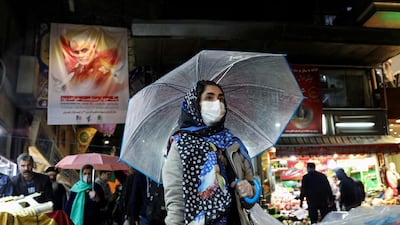Iran's coronavirus death toll passed 60,000 on Sunday, official figures showed, as it battles the Middle East's worst outbreak of the illness.
And Iranian officials, including President Hassan Rouhani, warned of a Covid-19 "fourth wave" with cases rising in areas of the country.
"Sadly in the past 24 hours, 93 people lost their lives to Covid-19, and total deaths from this disease reached 60,073," health ministry spokeswoman Sima Lari said in a televised address.
Iran has registered a total of 1,631,169 infections, the ministry said.
But some officials, including Health Minister Saeed Namaki, have admitted that the actual numbers are probably higher than the official figures.
"We have to observe restrictions probably for months, and maybe for the whole of the next year," Mr Rouhani said at the country's weekly Covid-19 taskforce meeting on Saturday.
He called on citizens to better observe health protocols in the new Iranian year starting on March 21, saying Iran will face a "more difficult" situation over the next year by having to battle "mutated strains of the virus".
The coronavirus taskforce spokesman, Alireza Raisi, on Friday said Iran was "very concerned" about the more contagious variant of the virus, Identified in Britain, that has already "circulated in the country."
"We have identified 112 people infected with the British variant in the country, eight of whom have died," Mr Raisi said, according to the health ministry.
He said the variant was seen in many provinces including the capital Tehran, and the virus's new focal point in the south-west, Khuzestan.
Similar to previous waves, Khuzestan is among the first areas to relapse into "red", the highest level on Iran's risk scale.
The number of daily infections nationwide has hit 8,000 in recent days, a level still much lower than the record high of 14,051 infections registered on November 27.
Daily deaths dropped below 100 in early January, the lowest level since June.
Tehran started a national vaccination campaign on February 9 using Russia's Sputnik V vaccine, with the first priority given to health workers, the elderly, and those with pre-existing health conditions.
Health Ministry spokesman Kianoush Jahanpour told AFP on Sunday that "110,000 vaccine doses have been distributed" in Iran so far, without specifying the number of people who had received the first injection.
Iran will start to administer the second dose on March 2, Mr Jahanpour said.
He said Iran bought two million doses of Sputnik V, which will be delivered gradually.
Iranian state media on Sunday reported that 250,000 doses of Sinopharm's vaccine were delivered to Tehran, a day after Mr Jahanpour announced they were donated by the Chinese government.
Mr Namaki has said Iran would also receive 4.2 million doses of the vaccine developed by Anglo-Swedish firm AstraZeneca and the University of Oxford, bought through the international vaccine fund Covax.
Iran is also working on locally developed vaccines, with clinical trials of a second drug starting on Sunday.
Razi Cov Pars was developed at the Razi Vaccine and Serum Research Institute, which is linked to the agriculture ministry, and unveiled this month.
Its clinical trial began with two male volunteers at Tehran's Rasoul Akram hospital, state TV showed.
The Razi centre's deputy chief, Mohammad Mehrabadi, told those attending a ceremony at the hospital that 133 people volunteered for the trial.
Iran started clinical trials of its first locally developed vaccine in late December.


